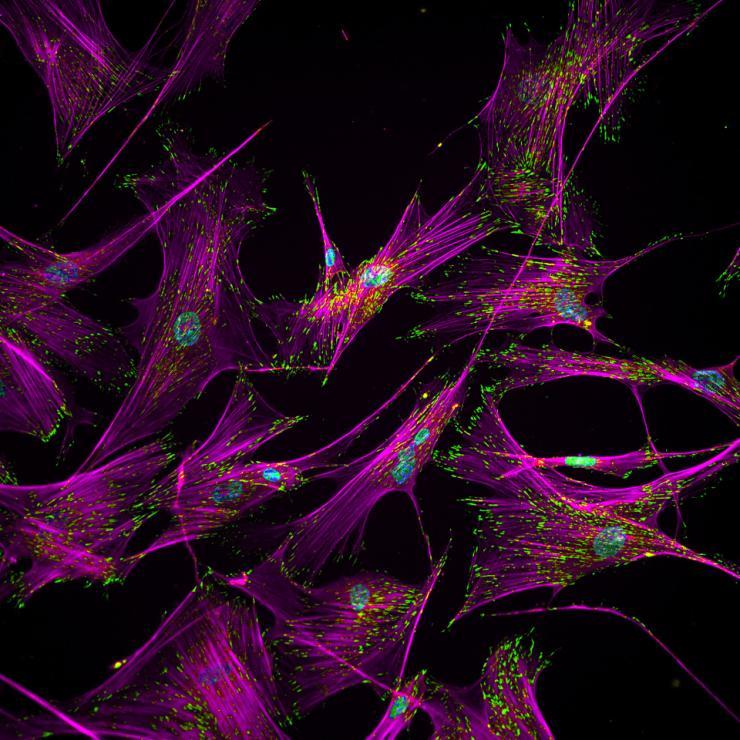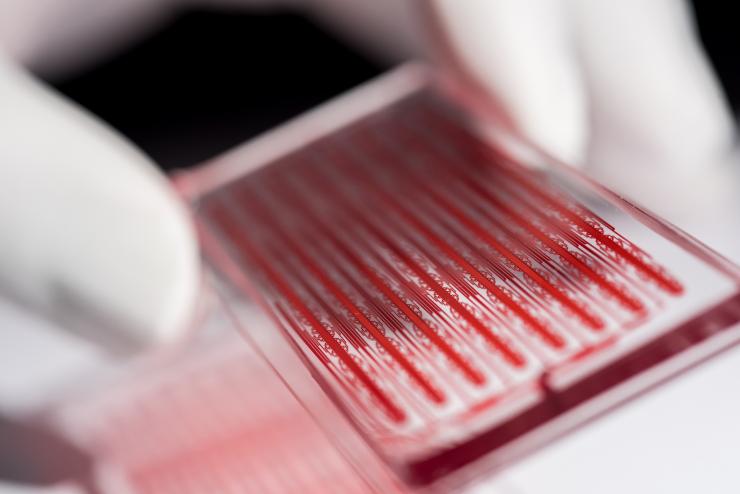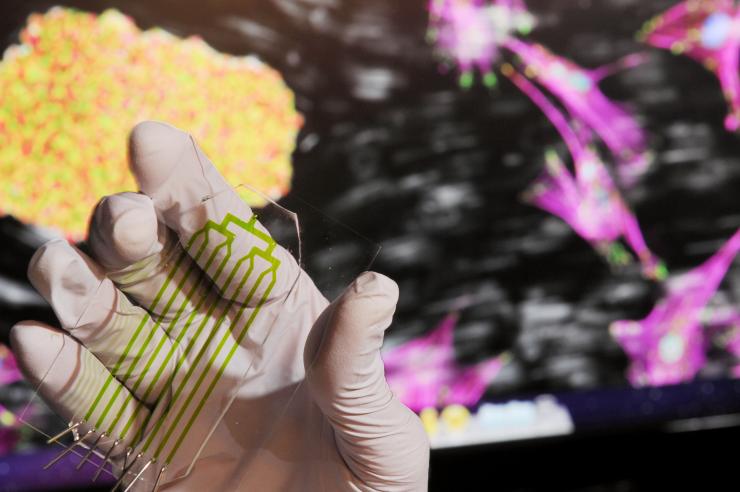Roadmap for Advanced Cell Manufacturing Shows Path to Cell-Based Therapeutics
Jun 11, 2016 — Atlanta, GA

Image shows adult human fibroblast cells with intracellular proteins involved in adhesion of these cells to an extracellular matrix. Magenta represents actin stress fibers in a cell and green staining represents a focal adhesion protein vinculin, which together contribute to how strongly these cells adhere to a matrix surface. Blue is the nucleus of a cell. These fibroblasts are converted to human induced pluripotent stem cells through a reprogramming process during which restructuring of the adhesion proteins takes place. (Image courtesy of Ankur Singh)
An industry-driven consortium has developed a national roadmap designed to chart the path to large-scale manufacturing of cell-based therapeutics for use in a broad range of illnesses including cancer, neuro-degenerative diseases, blood and vision disorders and organ regeneration and repair.
Over the past decade, new and emerging cell-based medical technologies have been developed to manage and possibly cure many conditions and diseases. In 2012 alone, these technologies treated more than 160,000 patients. Before these treatments can be more widely available, however, the cell therapeutics community will have to develop the capability for advanced, large-scale manufacturing of high-quality and consistent living cells.
To advance that goal, the Georgia Research Alliance (GRA) and the Georgia Institute of Technology (Georgia Tech) have launched the National Cell Manufacturing Consortium (NCMC), an industry-academic-government partnership that recently released the National Roadmap for Advanced Cell Manufacturing. Establishment of the consortium and development of this 10-year national roadmap was sponsored by the National Institute of Standards and Technology (NIST).
The roadmap was announced June 13 at the White House Organ Summit.
“The cell manufacturing roadmap effort is mission critical to establish the United States as the world leader in cell therapy manufacturing,” said Greg Russotti, Ph.D., vice-president of technical operations for Celgene Cellular Therapeutics. “Cell therapies offer exciting next-generation opportunities that may help patients live longer and better lives, reduce the burden on health care and benefit society. Producing sufficient quantities of high quality cell therapies so that patients have access will not be possible without significant advances in the field of cell therapy manufacturing. Industrial, academic, and government stakeholders collaborated to construct this roadmap, which delineates our path to U.S. leadership in the emerging field of cell therapy production.”
Development of the roadmap required strong support and involvement from more than 60 representatives from industry, government and nonprofit organizations.
“MilliporeSigma (formerly EMD Millipore) supports consortia, like the National Cell Manufacturing Consortium, that bring together industry, innovators, clinicians and academics to advance the field of cell therapy,” said Martha S. Rook, Ph.D., head of novel therapies for the company. “The consortium’s cell manufacturing roadmap is a valuable resource to help identify and address challenges in cell manufacturing.”
While research has demonstrated the value of cell therapies – using adult stem cells and immune system cells – improvements are needed to make these cells broadly available to the medical community.
“The aspirin you buy today from one pharmacy is essentially the same as the aspirin you buy from another pharmacy, but cell-based therapies may have different efficacy depending on the source and manufacturing processes,” said Krishnendu Roy, Robert A. Milton Chair and professor in the Wallace H. Coulter Department of Biomedical Engineering at Georgia Tech and Emory University. “There are established ways to quickly assess the efficacy and safety of small-molecule drugs that are acceptable around the world. We want to develop and establish similar processes for therapeutic cell manufacturing.”
Established in 2014 through a NIST Advanced Manufacturing Technology (AMTech) grant, the NCMC is an industry-driven consortium including cell manufacturing experts from industry, academic research, clinical good manufacturing practice (GMP) centers, government agencies and private foundations.
Georgia is positioning itself to be at the forefront of this new and growing market with its research institutions playing a vital role in the consortium. Researchers from Emory University, Georgia Tech, and the University of Georgia are contributing to the ongoing work of the NCMC. The Atlanta-based Marcus Foundation recently made a major gift to Georgia Tech to establish the Marcus Center for Therapeutic Cell Characterization and Manufacturing (MC3M). The new center, the first of its kind in the United States, will develop processes and techniques for ensuring the consistent, low-cost, large-scale manufacture of high-quality living cells used in cell-based therapies.
“The NIST grant kick-started our efforts to develop a national roadmap for cell manufacturing” said Michael Cassidy, president and CEO of the Georgia Research Alliance. “The cell manufacturing industry is an emerging and growing industry with annual revenues of over $1 billion. Completion of this roadmap positions Georgia at the forefront of one of the most exciting new initiatives of this century.”
For more information on the National Cell Manufacturing Consortium and to view the roadmap, visit http://cellmanufacturingusa.org.
About Georgia Research Alliance
The Georgia Research Alliance (GRA) works to expand research and commercialization capacity in Georgia’s universities to recruit world-class talent, seed new companies and transform lives. For over twenty-five years, GRA has worked to strengthen the university research enterprise in Georgia by working in partnership with the University System of Georgia and the Georgia Department of Economic Development to create the companies and jobs of Georgia’s future. Visit www.gra.org for more information.
About Georgia Institute of Technology
The Georgia Institute of Technology is widely regarded as one of the world’s top technological research universities. Ranked 7th among public universities by U.S. News & World Report, Georgia Tech has more than 25,000 undergraduate and graduate students, and conduced $726 million in research during 2014. Visit www.gatech.edu for more information.
Research News
Georgia Institute of Technology
177 North Avenue
Atlanta, Georgia 30332-0181 USA
Media Relations Contacts:
Georgia Tech: John Toon (jtoon@gatech.edu) (404-894-6986) or
Georgia Research Alliance: Amanda Schroeder (aschroeder@gra.org) (404-443-2659)

Close-up image shows the microfluidic device used by Georgia Tech researchers to capture cancer cell clusters in blood samples. The fluid shown in the device is a colored liquid designed to simulate the appearance of blood. (Credit: Rob Felt, Georgia Tech)

Image shows a close-up view of a microfluidic device that exploits the differences in adhesion strength between derived stem cells and contaminating cell types in a heterogeneous culture to selectively isolate cells of interest using fluid shear forces. Georgia Tech researchers designed the technique to separate the cells. (Georgia Tech Photo: Gary Meek)




